GARDENS BY THE BAY
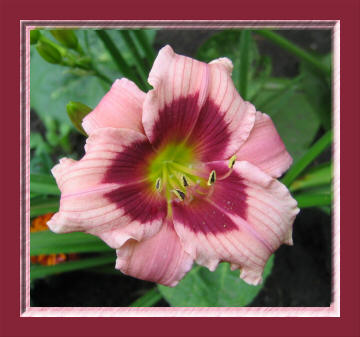
BUTTERFLY MAGNETS & THEIR COMPANIONS - 1
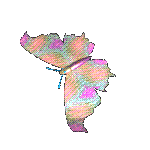 Butterflies bring a wonderful beauty to our gardens. They also provide a valuable service - pollinating our flowers. During four stages of development - egg, caterpillar, chrysalis and adult - they require a variety of plant species for various purposes. Eggs are laid on host plants, many of which are native. The monarch butterfly, for example, deposits eggs on milkweed on which the caterpillars feed once hatched. As adults, various species are active from early spring to late fall and require food to thrive.
To supply their needs you must first add the right plants, preferably in large groups with lots of colour, the quality that first attracts them. It is best to plan a succession of bloom from various plants throughout the season. They like nectar-producing flowers with short tubular blossoms for easy access. Single-flowered forms are preferable to doubles. If they happen to be flat-topped, so much the better, as this provides a place for the butterflies to land. Some sources suggest a preference for purple, yellow, orange and red flowers.
Butterflies will surely come flocking to your gardens if you plant some of the perennials noted below along with their recommended companions.
Butterflies bring a wonderful beauty to our gardens. They also provide a valuable service - pollinating our flowers. During four stages of development - egg, caterpillar, chrysalis and adult - they require a variety of plant species for various purposes. Eggs are laid on host plants, many of which are native. The monarch butterfly, for example, deposits eggs on milkweed on which the caterpillars feed once hatched. As adults, various species are active from early spring to late fall and require food to thrive.
To supply their needs you must first add the right plants, preferably in large groups with lots of colour, the quality that first attracts them. It is best to plan a succession of bloom from various plants throughout the season. They like nectar-producing flowers with short tubular blossoms for easy access. Single-flowered forms are preferable to doubles. If they happen to be flat-topped, so much the better, as this provides a place for the butterflies to land. Some sources suggest a preference for purple, yellow, orange and red flowers.
Butterflies will surely come flocking to your gardens if you plant some of the perennials noted below along with their recommended companions.
* Watch for the animated hummingbird and butterfly with the plants that attract them. *
The deer icon indicates plants that deer are not usually attracted to.
   The best time and method to propagate plants can be found on our image-intensive PROPAGATION page.
To help your plants grow their best, check out our FERTILIZATION page.
To create your own plant partnerships based on tried and true color theory, check out our GARDEN COLOR page.
To see if a particular plant is on this page press Ctrl+F, type in the name, then click the Find button.
The best time and method to propagate plants can be found on our image-intensive PROPAGATION page.
To help your plants grow their best, check out our FERTILIZATION page.
To create your own plant partnerships based on tried and true color theory, check out our GARDEN COLOR page.
To see if a particular plant is on this page press Ctrl+F, type in the name, then click the Find button.
ANAPHALIS
 Pearly Everlasting, a native North American wildflower, has papery white button flowers with yellow centres over grey foliage, lovely for a late-summer effect. This plant is the food source for larvae of the Painted Lady butterfly that can severely damage its foliage and is also the favourite caterpillar host plant for the American Lady butterfly.
Anaphalis margaritaceae: Pearly Everlasting, 12-24"x15"
More information about this perennial can be found at the link below.
Pearly Everlasting, a native North American wildflower, has papery white button flowers with yellow centres over grey foliage, lovely for a late-summer effect. This plant is the food source for larvae of the Painted Lady butterfly that can severely damage its foliage and is also the favourite caterpillar host plant for the American Lady butterfly.
Anaphalis margaritaceae: Pearly Everlasting, 12-24"x15"
More information about this perennial can be found at the link below.
Pearly Everlasting with silver foliage
ANTENNARIA
 Sometimes called Cat's-Paw or Pink Pussytoes, this silvery-grey-foliaged plant will be covered with pink flowers in late spring. Trim flowering stems back after bloom and enjoy the foliage effect for the rest of the gardening season.
Antennaria dioica rubra: Pink Pussytoes, 10-12"x12"
Sometimes called Cat's-Paw or Pink Pussytoes, this silvery-grey-foliaged plant will be covered with pink flowers in late spring. Trim flowering stems back after bloom and enjoy the foliage effect for the rest of the gardening season.
Antennaria dioica rubra: Pink Pussytoes, 10-12"x12"
food source for 'Painted Lady' butterfly
over: alpine bulbs
under: dwarf shrubs or conifers
with: Euphorbia amygdaloides 'Rubra' (Purple Wood Spurge)
For more information about Pussytoes, follow the link below.
Pink Pussytoes
ASCLEPIAS
   Most Butterfly Weed species are native North American wildflowers. It is the host plant for the Monarch butterfly which gains protection when it ingests the unpalatable chemicals in its leaves. Late to appear in spring, this plant eventually produces blooms that can be used for cutting or enjoyed in the garden by butterflies and people alike. Butterfly Weed flowers are a rich nectar source for many adult butterflies such as the Black Swallowtail, Eastern Tiger Swallowtail, Spicebush Swallowtail, Checkered White, American Copper, California Hairstreak, Gray Hairstreak, Zebra, Great Spangled Fritillary, Pearl Crescent and Silver-Spotted Skipper.
Most Butterfly Weed species are native North American wildflowers. It is the host plant for the Monarch butterfly which gains protection when it ingests the unpalatable chemicals in its leaves. Late to appear in spring, this plant eventually produces blooms that can be used for cutting or enjoyed in the garden by butterflies and people alike. Butterfly Weed flowers are a rich nectar source for many adult butterflies such as the Black Swallowtail, Eastern Tiger Swallowtail, Spicebush Swallowtail, Checkered White, American Copper, California Hairstreak, Gray Hairstreak, Zebra, Great Spangled Fritillary, Pearl Crescent and Silver-Spotted Skipper.
Asclepias tuberosa: Butterfly Weed, 1-3'x2'
Asclepias tuberosa 'Gay Butterflies': yellow and orange shades
Asclepias incarnata 'Ice Ballet': white Butterfly Weed 18-24" tall
combined with: Achillea 'Summer Shades Mixture', Aquilegia 'Maxistar' (yellow) & Chrysanthemum parthenium
For more information about the care and maintenance of this perennial, follow the links below.
orange Butterfly Weed
white Butterfly Weed
ASTER
 There are many choices from this large genus whose flowers are magnets for butterflies. Whatever your preference for colour or height or even season of bloom, there is no shortage of choices for many garden situations. This is a favourite nectar source of the Checked White, Clouded Sulphur, Pearl Crescent, Painted Lady, Common Buckeye, Viceroy and Common Checkered-Skipper butterflies as well as the host plant for larvae of the Pearl Crescent butterfly.
There are many choices from this large genus whose flowers are magnets for butterflies. Whatever your preference for colour or height or even season of bloom, there is no shortage of choices for many garden situations. This is a favourite nectar source of the Checked White, Clouded Sulphur, Pearl Crescent, Painted Lady, Common Buckeye, Viceroy and Common Checkered-Skipper butterflies as well as the host plant for larvae of the Pearl Crescent butterfly.
Aster amellus'Violet Queen': Italian Aster, 24-30"
Aster x frikartii: Frikart's Aster, 2-3'x2-3', rough-textured deep green foliage, fertilize regularly for long bloom
in front of: Artemisia ludoviciana 'Valerie Finnis'
with late summer & fall bloomers: Phlox paniculata, Rudbeckia, Ornamental Grasses
combined with: Artemisia ludoviciana 'Silver King' & Chrysanthemum x rubellum 'Clara Curtis'
Aster x frikartii: blue forms
with: Lavatera 'Rosea', fall Sedum such as 'Autumn Joy' or Sedum spectabile
with: Hypericum calycinum
with: Anemone japonica (pink), Anemone japonica 'Margarete' (a deep pink semi-double)
Aster x frikartii 'Monch': the finest perennial Aster, 28-30"x18", taller than the species
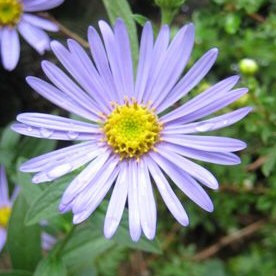
generally with: pale pink or powder blue shades
with: Coreopsis verticillata 'Golden Showers'
with: silver-gray Artemisia 'Powis Castle' or Stachys olympica 'Silver Carpet'
with: Hemerocallis 'Happy Returns' or Hemerocallis 'Palest Yellow'
Aster novae-angliae: New England Aster, height varies x 18" spread
with other butterfly magnets: Solidago
with: Aconitum, Anemone (fall-blooming), Boltonia asteroides, Sedum (especially 'Autumn Joy'), Gypsophila, Artemisia 'Powis Castle' (to hide untidy base of main plant)
combined with: Achillea x 'Moonshine' & Anemone hybrida
combined with: Helictotrichon sempervirens & Salvia 'East Friesland'
with ornamental grasses: Calamagrostis arundinacea var. brachytricha
with fall perennials: Helianthus, Patrinia scabiosifolia 'Nagoya'
Aster: purple or pink fall-blooming forms
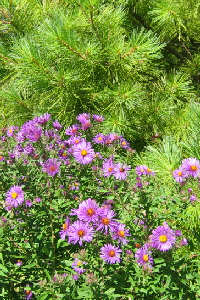
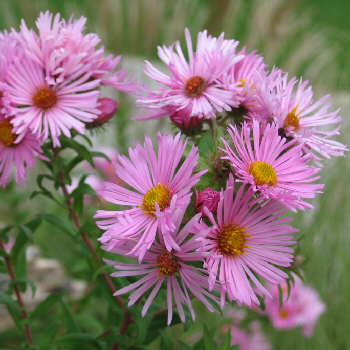
behind: yellow perennials (to pick up the yellow of the aster's centre)
Aster: mounding types
with: Ornamental Grasses i.e. Panicum, Pennisetum esp. P. alopecuroides 'Hameln', Miscanthus
Aster novae-angliae 'Alma Potschke': deep salmon-pink, 3 to 3-1/2'x2-3'
with: gray to tone down its bright rose-pink flowers
with: Boltonia asteroides 'Snowbank'
with: Aster novae-angliae 'Autumn Snow' (White New England Aster)
behind: Gypsophila, Sedum, Artemisia (to hide untidy stems)
Aster novae-angliae 'Autumn Snow': White New England Aster
with: Aster novae-angliae 'Alma Potschke'
behind: Sedum 'Autumn Joy'
Aster novae-angliae 'Hella Lacy': royal-purple, floriferous, 4-5' tall
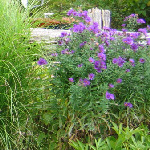
note: attracts monarch butterflies
called a "showstopper" by C. Colston Burrell, who claims it blooms for up to 4 weeks
where: rear of border
good with: pastel pink and pale powder blue
with: silver-gray Artemisia 'Powis Castle'
behind: Stachys olympica 'Silver Carpet'
Aster novae-angliae 'Purple Dome': Dwarf New England Aster, only 18" tall
with: Hemerocallis 'Stella d'Oro'
Aster: blue New England or New York types
with pink perennials: Anemone japonica esp. 'Margarete', Lavatera 'Rosea', fall Sedum i.e. 'Autumn Joy',
Aster novi-belgii: blue forms, height varies x 12-18" spread
with: Sedum spectabile, Sedum 'Autumn Joy'
Aster novi-belgii 'Benary's Composition Mix': 24-30"x24", tall accent with a late bloom
with: Aconitum, Anemone hupehensis
with: Sedum, Gypsophila, Artemisia 'Powis Castle' (to hide untidy base of main plant)
with: Boltonia asteroides, Centranthus ruber, Coreopsis verticillata, Dictamnus albus purpureus, Echinops,
Eupatorium, Gypsophila paniculata, Helenium autumnale, Helianthus, Heliopsis, Papaver nudicaule,
Patrinia scabiosifolia, Sedum 'Autumn Joy', Solidago
Aster novi-belgii 'Kassel': pink Michaelmas Daisy
Aster villosa 'Milka': 14" tall, soft lavender-blue
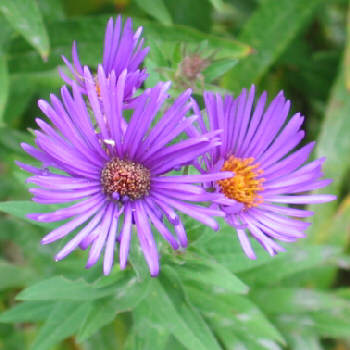
my research says the flower of this plant should be double; mine is clearly single, but beautiful nonetheless
If you need more details about the Aster, or forms of specific colours or for special situations, follow any of the links below.
blue Asters
pink Asters
purple Asters
Asters for shady sites
white Asters
BUDDLEIA
   What more likely candidate to attract butterflies can there be than one with Butterfly in its name. The Butterfly Bush provides colour in the late season border and a delicious scent that lures both butterflies and hummingbirds in droves. Butterfly Bush is a favoured nectar source for Pipevine Swallowtail, Black Swallowtail, Anise Swallowtail, Eastern Tiger Swallowtail, American Snout, Great Spangled Fritillary, Pearl Crescent, Red Admiral, Painted Lady, Common Buckeye, Common Checkered-Skipper and of course the Monarch Butterfly.
What more likely candidate to attract butterflies can there be than one with Butterfly in its name. The Butterfly Bush provides colour in the late season border and a delicious scent that lures both butterflies and hummingbirds in droves. Butterfly Bush is a favoured nectar source for Pipevine Swallowtail, Black Swallowtail, Anise Swallowtail, Eastern Tiger Swallowtail, American Snout, Great Spangled Fritillary, Pearl Crescent, Red Admiral, Painted Lady, Common Buckeye, Common Checkered-Skipper and of course the Monarch Butterfly.
Buddleia: Butterfly Bush, 3-8'x3-4'
combined with: other butterfly-attracting plants in informal meadow plantings
with summer and fall-blooming plants: Aster, Helenium, Echinacea purpurea, Ornamental Grasses
underplanted with: ground covers
a dynamite combination with: Echinacea purpurea, Echinacea purpurea 'White Swan' & Liatris
Buddleia alternifolia: Fountain Butterfly Bush, pendulous, lilac-purple flowers
as: specimen plant for accent, anchor in large perennial borders
with: perennial & shrub plantings
Buddleia x 'Lochinoch': hybrid with B. fallowiana, lavender flowers & silvery-gray leaves
with pastel flowers of: Achillea x 'Anthea' (flat creamy heads), Boltonia asteroides 'Pink Beauty', Aster tongolensis
'Wartburg Star' (18", blue with orange centres), Phlox maculata 'Delta'
behind: Crocosmia 'Citronella'
Buddleia 'Pink Profusion':
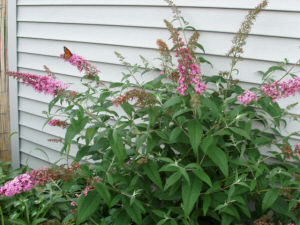
see for yourself how well the magnet effect works in the image above
Buddleia 'Red Plume'
with: soft yellow Alcea rugosa (synonym Alcea ficifolia)
Buddleia x weyeriana 'Sungold'
For more information about this plant, popular with butterflies and hummingbirds, follow the links below.
hummingbird-friendly Butterfly Bush
orange Butterfly Bush
CARYOPTERIS
 Bluebeard is another shrub that provides mid-summer colour in the garden. Also known as Blue-Mist Shrub and Blue Spirea, this plant is smothered with blue to purple-blue flowers that attract both butterflies and bees.
Bluebeard is another shrub that provides mid-summer colour in the garden. Also known as Blue-Mist Shrub and Blue Spirea, this plant is smothered with blue to purple-blue flowers that attract both butterflies and bees.
Caryopteris x clandonensis, 2-3'x24-30"
note: treat either as a small shrub or as a perennial
where: as a low hedge, along walkways, in front of foundation plants, in shrub borders
as filler in borders with: Hemerocallis, Coreopsis verticillata, other late-bloomers
with: Campanula lactiflora 'Loddon Anna', Sedum 'Autumn Joy'
behind: Veronica incana
combined with: Ornamental Grasses
Caryopteris x clandonensis 'Blue Mist': lavender-blue flowers
Caryopteris x clandonensis 'Dark Knight': violet-blue flowers (deep purple), one of the darkest forms
with: Sedum 'Autumn Joy', Lespedeza 'Pink Fountain'
Caryopteris x clandonensis 'Longwood Blue', sky blue, silvery-grey leaves, floriferous
where: massed in a line
underplanted with: Sternbergia lutea (a yellow, autumn-flowering bulb)
Caryopteris 'Worcester Gold', bright blue flowers, golden-green foliage
with: Achillea millefolium 'Terra Cotta' & Nepeta 'Souvenir d'André Chaudron'
More information about this shrubby plant can be found by following the link below.
Bluebeard with silvery foliage
ECHINACEA
  The Purple Coneflower is a popular source of nectar and pollen for both butterflies and bees. This native North American wildflower blooms in early to mid-summer and, left intact for the winter, its flowers can also provide a seed source for overwintering birds. This is a favourite nectar plant for the Great Spangled Fritillary, Pearl Crescent and Red Admiral butterflies.
The Purple Coneflower is a popular source of nectar and pollen for both butterflies and bees. This native North American wildflower blooms in early to mid-summer and, left intact for the winter, its flowers can also provide a seed source for overwintering birds. This is a favourite nectar plant for the Great Spangled Fritillary, Pearl Crescent and Red Admiral butterflies.
Echinacea purpurea: Purple Coneflower, 30-36"x18-24"
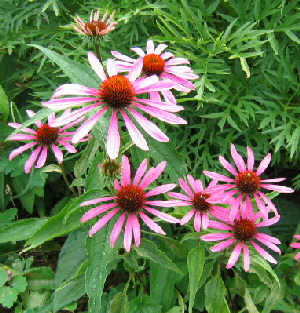
where: prairie gardens
meadow combination with: Solidago, Asclepias tuberosa, Rudbeckia
with: Ornamental Grasses (tall, upright to arching forms), Buddleia davidii
combined with: Lilium 'Thunderbolt' (apricot Trumpet), Althaea, Lysimachia clethroides &Echinops ritro
with: Coreopsis (summer-blooming), Phlox paniculata 'Mt. Fujiyama' (white), Physostegia virginiana 'Alba' (18-24")
with: Dodecatheon meadia (rose-pink)
with: Patrinia scabiosifolia 'Nagoya' (bright yellow), Sidalcea including S. malviflora 'Mr. Lindburgh'
with: Phlox paniculata, Liatris spicata, Liatris spicata 'Floristan White', Achillea esp. 'Coronation Gold',
Chrysanthemum x superbum, Hemerocallis, Perovskia triplicifolia
with: Rudbeckia, including gold-flowered spp, Rudbeckia 'Marmalade', Rudbeckia laciniata 'Goldquelle' (a lovely shorter version of 'Golden Glow')
with: Stachys 'Helen von Stein', Verbena spp. including V. bonariensis
for pastel combination with: Stachys byzantina, Monarda (pink), Geranium spp. (all in front of Ornamental Grasses)
gorgeous in combination with: Echinacea purpurea 'White Swan', Liatris & Buddleia
with: Perilla frutescens 'Atropurpurea' (annual purple-leaved Perilla)
in front of or beside: Artemisia abrotanum
with: Perovskia atriplicifolia, Gypsophila paniculata, Filipendula rubra
with: Goniolinum tartaricum (German Statice), Limonium latifolium (Sea Lavender, Statice)
for contrast of foliage & flowers with: Artemisia schmidtiana nana 'Silver Mound'
Echinacea purpurea 'Bright Star': rose-pink flat flower heads
combined with: Acanthus mollis, Nepeta x faassenii & Hemerocallis 'Yesterday Memories'
combined with: mauve Hemerocallis 'Little Grapette', pink Allium 'Summer Beauty' & pale yellow Coreopsis 'Moonbeam'
Echinacea purpurea 'Magnus': 24-30" tall with huge horizontal flower heads
combined with: Acanthus mollis, Nepeta x faassenii, & Hemerocallis 'Yesterday Memories'
Echinacea purpurea alba 'White Swan': white Coneflower, 1-2' tall
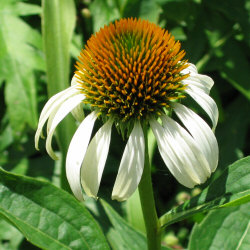
with: Filipendula rubra 'Venusta' (Martha Washington's Plume)
with: Achillea 'Coronation Gold' & Eremurus Shelford Hybrids
with: Echinacea purpurea (purple forms)
offset behind: Liatris including L. ligulistylis (3-5'; rosy-purple)
combined with: Lilium 'Mount Everest', Monarda 'Blue Stocking' & Monarda 'Marshall's Delight'
combined with: Scabiosa 'Pink Mist', Echinops ritro & Verbascum 'Benary's Hybrids'
combined with: Gypsophila paniculata 'Perfecta' & Lysimachia clethroides
combined with: Paeonia & Gypsophila paniculata
combined with: Echinacea purpurea, Liatris, Buddleia
For more useful information about the Purple Coneflower, follow the links below.
pink Purple Coneflower
white Purple Coneflower
GAILLARDIA
  Blanket Flower provides bright, long-blooming colour with its daisy-like flowers that are also effective for cutting.
Blanket Flower provides bright, long-blooming colour with its daisy-like flowers that are also effective for cutting.
Gaillardia x grandiflora: Blanket Flower, height varies x 12" spread
Gaillardia x grandiflora 'Baby Cole'
Gaillardia x grandiflora 'Goblin'
Gaillardia x grandiflora 'Burgundy'deep wine-red flowers, 2-3'x18"
You can find additional information about the Blanket Flower at the links below.
red Blanket Flower
yellow Blanket Flower
HELIANTHUS
 If you are only familiar with annual forms of Sunflower, you will be thrilled with the many perennial species and cultivars. Useful for both fresh and dried arrangements, perennial Sunflowers also attract beneficial insects to your gardens and its seeds provide a welcome food source for many songbirds. There are types of perennial Sunflower for both sunny and shady sites.
If you are only familiar with annual forms of Sunflower, you will be thrilled with the many perennial species and cultivars. Useful for both fresh and dried arrangements, perennial Sunflowers also attract beneficial insects to your gardens and its seeds provide a welcome food source for many songbirds. There are types of perennial Sunflower for both sunny and shady sites.
Helianthus
If you need more information about the perennial Sunflower, follow the link below.
yellow Sunflower
HEMEROCALLIS
 The daylily has an interesting history of use - as food, medicine and ornamentation. Small wonder then that the thousands of cultivars available in a variety of sizes, colours, forms and bloom times make it so popular today.
All daylilies are registered with the American Hemerocallis Society. By the end of the year 2008 there were 66,347 such registrations. You can find information about them all by visiting the
American Hemerocallis Society Cultivar Database.
Be sure to check out our new page of Daylilies - Spider and Unusual Form.
The daylily has an interesting history of use - as food, medicine and ornamentation. Small wonder then that the thousands of cultivars available in a variety of sizes, colours, forms and bloom times make it so popular today.
All daylilies are registered with the American Hemerocallis Society. By the end of the year 2008 there were 66,347 such registrations. You can find information about them all by visiting the
American Hemerocallis Society Cultivar Database.
Be sure to check out our new page of Daylilies - Spider and Unusual Form.
Hemerocallis: Daylily
where: to hide dying foliage of Narcissus and Tulipa in late spring
perfect behind: Hardy Geranium forms
over: Muscari
with: Saponaria ocymoides
with: Kniphofia, Lavandula, Lilium, Lythrum salicaria 'Morden Pink', Scabiosa caucasica
with: Oenothera spp. including O. fruticosa, Oenothera macrocarpa (formerly Oenothera missouriensis),
Oenothera tetragona 'Youngii'
with: Salvia spp. including Salvia nemorosa 'Blue Queen', Salvia x superba, Salvia x superba 'East Friesland'
in moist sunny areas with: Lobelia siphilitica
with: Veronica spp. including V. austriaca 'Crater Lake Blue', V. gentianoides, V. longifolia 'Icicle',
V. spicata, V. spicata 'Red Fox', Veronicastrum virginicum (purple)
beside: spiked Veronica spicata, flat-topped Achillea spp., Phlox paniculata
combined with: Paeonia & Iris
with: Echinacea purpurea & Paeonia
with: Verbena bonariensis
with: Yucca filamentosa
for shape contrast with: Hosta spp.
foliage contrast with: Sedum kamtschaticum
shape contrast behind: Bergenia
behind: Sedum
in front of: Thalictrum aquilegiafolium
with: Stokesia laevis
with: Ornamental Grasses, especially Miscanthus sinensis 'Silberfeder' or 'Zebrinus'
with: Phlox paniculata 'Mt. Fujiyama', Platycodon grandiflorus, Rudbeckia
with: Nepeta x 'Dropmore Blue' (if cut back hard before spring bloom to force later flowering during daylily season)
combined with: Iris x germanica & Sedum kamtschaticum
Hemerocallis: any colour
combined with: Helenium (rusty-red), Achillea 'Great Expectations' (buff yellow) & Miscanthus sinensis 'Zebrinus'
Hemerocallis: fruity shades
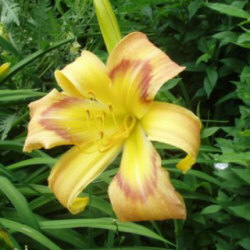
with: blue Veronica spicata, Veronica 'Sunny Border Blue', Monarda didyma (red)
Hemerocallis: peach tones
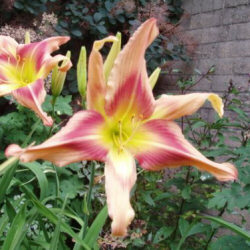
combined with: Chrysanthemum x superbum & Veronica (blue) or Platycodon (lavender)
in front of: white Phlox paniculata, Veronica chaixii 'Album'
with: Veronicastrum virginicum (white)
Hemerocallis: melon & apricot
with: Heuchera 'Coral Cloud'
in front of: Phlox paniculata (white), Veronica chaixii 'Album'
Hemerocallis: yellow forms
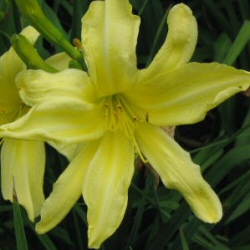
with: Astilbe
Hemerocallis: lemon yellow; blue, silver and yellow combination with the next 3 groupings
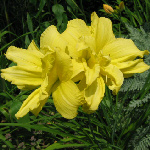
edging combination with: Nepeta 'Blue Wonder', Coreopsis 'Moonbeam', Arrhenatherum elatius var. bulbosum
'Variegatum' (cream-striped) & Stachys byzantina 'Silver Carpet'
above combination in front of: Lilium & Achillea 'Moonshine', Artemisia 'Powis Castle', Delphinium 'Belladonna'
(sky-blue), Eryngium, Echinops ritro, Kniphofia (primrose- yellow)
above 2 combinations in front of: Rosa 'Harrison's Yellow', Achillea 'Gold Plate', Helenium (yellow), &
Hemerocallis: red forms
Hemerocallis: tawny-coloured
combined with: Phlox paniculata (white), Achillea filipendulina 'Gold Plate' & Aconitum x bicolor
Hemerocallis citrina: Citron Daylily, 3-4'x2'
where: near patio or deck to enjoy fragrance of evening blooms
Hemerocallis flava: clear yellow, the earliest to bloom, 30-36"x24"
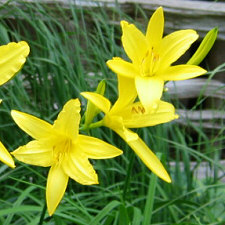
synonym: Hemerocallis lilio-asphodelus
co-blooming with: pink Dictamnus albus purpureus & deep purple Iris sibirica
with: Veronica 'Romily Purple' (a deep violet)
Hemerocallis fulva: Wild Orange Daylily, 30-48"x2-3'
where: between or under shrubs or trees; this is very aggressive
to hide dying foliage of: Narcissus & Tulipa
with: late-blooming true bulbous Lilies, Lythrum, Gloriosa Daisies, Rudbeckia, tall Mulleins, Heliopsis
in some shade with: tall blue Aconitum, Astilbe, Hosta, Ferns, Iris sibirica
Hemerocallis 'Autumn Minaret': 6'
where: towering behind Rhododendron
Hemerocallis 'Candy': coral
with: warm-yellow Hemerocallis 'Purity'
Hemerocallis 'Cherry Cheeks': raspberry-pink
Hemerocallis 'Children's Festival': a soft peach & apricot blend
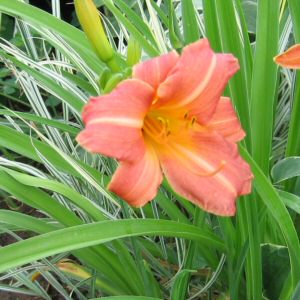
perfectly partnered above with: Arrhenatherum elatius bulbosum 'Variegatum'
also see partners for peach-toned and apricot daylilies above
Hemerocallis 'Corky': yellow, similar to but shorter than 'Mme. Bellum'
echo with: purple Iris with yellow bee-guides & yellow-flowered Verbascum bombyciferum
Hemerocallis 'Dine at Nine': 22", very ruffled pale cream-pink flower with chartreuse throat, Early
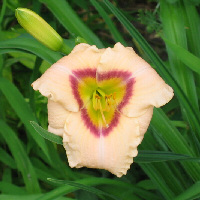
I'm still looking for the perfect partner for this subtle beauty
Hemerocallis 'Fairy Tale Pink': 24"x18-24", soft pink, 5-1/2" wide flower, Mid-season bloomer
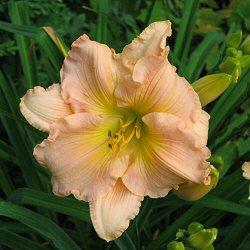
perfect wherever you put it, this wonderful cultivar shines from a distance
Hemerocallis 'Golden Gift': 32" scapes, 4" petals, gold self with a green throat, Mid-season bloom
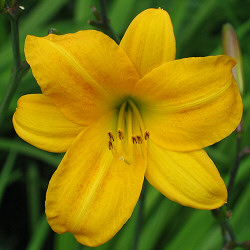
this plant was bought labelled 'Golden Gift' but may be something else
it displays faint reddish brushstrokes on both the top and reverse of the petals
it is clearly a miniature with tiny flowers but on tall stems
combined with: Achillea x 'Moonshine' & Lupinus
Hemerocallis 'Happy Returns': only 18" tall, prolific, canary-yellow
where: excellent for mass planting
with: other night-bloomers of any colour at all
with: Scabiosa x 'Butterfly Blue (Beauty)', Aster x frikartii 'Mönch'
Hemerocallis 'Holiday in Dixie': creamy-pink with a green throat, 24"x36"
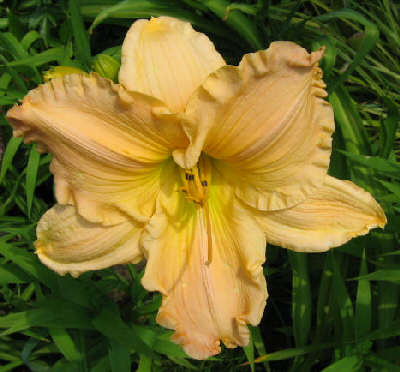
this large-flowered beauty will draw eyes away from anything nearby
Hemerocallis 'Hyperion': canary yellow, 40", Mid-season bloomer
with: Monarda 'Cambridge Scarlet'
combined with: Heuchera sanguinea & Echinops ritro
combined with: coral Hemerocallis 'Sweetbriar' & Echinops ritro
Hemerocallis 'Joan Senior': cream-coloured on opening, then whitening, 24", Early-Midseason bloomer
combined with: Artemisia 'Silver King' & Phlox paniculata Franz Schubert' (lilac-blue with purple eye)
combined with: Achillea x 'Coronation Gold', Miscanthus sinensis 'Silberfeder' & Veronicastrum virginicum 'Album'
Hemerocallis 'Green Kwanso': double orange, sometimes incorrectly referred to as 'Apricot Beauty'
Hemerocallis 'Lavender Tonic'
combined with: Lythrum virgatum 'Morden Pink' & Veronica longifolia 'Sunny Border Blue'
Hemerocallis 'Little Grapette': mauve
combined with: Echinacea purpurea 'Bright Star', pink Allium 'Summer Beauty', pale yellow Coreopsis verticillata
Hemerocallis 'Mme. Bellum': a yellow form
echo with: purple Iris with yellow bee-guides & yellow-flowered Verbascum bombyciferum
combined with: Achillea x taygetea & Veronica incana
Hemerocallis 'Painted Lady': light orange, 3'
Hemerocallis 'Palest Yellow': ruffled, extremely pale yellow
Hemerocallis 'Perennial Pleasures'
combined with: Lythrum virgatum 'Morden Pink' & Hemerocallis 'Prairie Blue Eyes'
Hemerocallis 'Pink Lavender Appeal': 26" diploid mid-season, unusual colour
with cool whites: Phlox paniculata 'Miss Lingard'
Hemerocallis 'Prairie Blue Eyes': 28-36"x24-36"
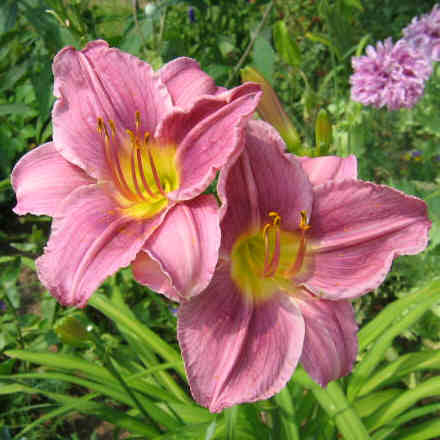
combined with: Hemerocallis 'Perennial Pleasures' & Lythrum virgatum 'Morden Pink'
Hemerocallis 'Purity': scapes rise high above foliage
where: to break up a solid mass of plants in mid-border
Hemerocallis 'Robin Coleman': miniature gold
where: around Rhododendron
Hemerocallis 'Satin Glass': pale yellow
with: Hosta under maple tree
Hemerocallis 'Sparks': brilliant red-orange
Hemerocallis 'Stella d'Oro': golden-yellow
Hemerocallis 'Summer Wine':
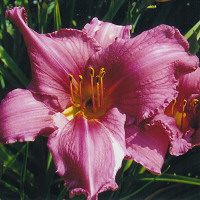
there is no shortage of perfect partnerships to try with this lovely daylily
Hemerocallis 'Thumbelina': 15" orange self, Mid-season bloom
with: Gaillardia x grandiflora 'Baby Cole' (only 8" tall)
Hemerocallis 'Train to Venice':

this is a "Must-Add" cultivar with huge flowers
Hemerocallis 'Yesterday Memories': 19", M, deep pink self with green centres, flowers 6.5" across
combined with: Acanthus mollis, Echinacea purpurea 'Bright Star' or 'Magnus' & Nepeta x faassenii
Hemerocallis altissima 'Statuesque': 5', fragrant, soft yellow
where: extreme rear of perennial border
You can find new and interesting information about the Daylily on each of the pages at the links below.
orange Daylilies
pink Daylilies
purple Daylilies
red Daylilies
white Daylilies
yellow Daylilies
Spider & Unusual Form Daylilies
FOR MORE BUTTERFLY-ATTRACTING PERENNIALS & THEIR COMPANIONS FOLLOW THE LINK BELOW.
All of our own Gardens By The Bay pages can be accessed by clicking on the links below.
HOME
GARDEN POETRY |
GARDEN POETRY MUSE
GEORGIAN BAY VIEW
BOTANICAL LATIN - BASICS
COLOR THEORY
THE GARDENS
CORNER GARDEN CONSTRUCTION |
CORNER GARDEN PLANTING |
LONG GARDEN
EAST GARDEN |
HOSTA GARDEN |
NORTH GARDEN |
WINTER GARDENS
PLANT PARTNERSHIPS
BLUE PERENNIALS Aconitum -
Geranium |
Iris - Vinca
BULBS Allium - Hyacinthus |
Narcissus only |
Tulipa only |
Minor Bulbs
BUTTERFLY MAGNETS Anaphalis - Hemerocallis |
Liatris - Veronicastrum
 DAYLILIES Spider & Unusual Form DAYLILIES Spider & Unusual Form EDGERS Arabis - Iris |
Nepeta - Veronica
FOLIAGE PERENNIALS
Alchemilla - Tanacetum
HOSTA Hosta - all
HUMMINGBIRD-FRIENDLY PERENNIALS Alcea - Salvia
ORANGE PERENNIALS Achillea - Tulipa
ORNAMENTAL GRASSES Acorus - Imperata |
Miscanthus - Spodiopogon
PINK PERENNIALS Achillea - Lilium |
Lychnis - Veronica
PURPLE PERENNIALS Aconitum - Liatris |
Polemonium - Veronica
RED PERENNIALS Achillea - Veronica
SHADE PERENNIALS Aegopodium - Erythronium |
Ferns - Polemonium |
Polygonatum - Vinca
SILVER FOLIAGE PERENNIALS
Achillea - Cerastium
|
Cornus - Limonium
|
Lunaria - Veronica
SIMPLY SPECIAL PERENNIALS Acanthus - Saxifraga
WHITE PERENNIALS Achillea - Iris |
Kalimeris - Yucca
YELLOW PERENNIALS Achillea - Hypericum |
Inula - Verbascum
VARIEGATED-FOLIAGE PERENNIALS Acorus - Erythronium |
Hakonechloa - Lysimachia |
Miscanthus - Yucca
PLANT PROFILES
Dianthus 'Tiny Rubies' |
Geranium |
Geum coccineum |
Kerria japonica |
Knautia macedonica
Paeonia tenuifolia |
Papaver somniferum |
Rudbeckia |
Salvia 'East Friesland'
Trollius |
Veronica 'Sunny Border Blue'
PROPAGATION
DIVISION - SPRING ONLY |
DIVISION - FALL ONLY |
DIVISION - SPRING OR FALL |
DO NOT DIVIDE
FERTILIZATION
EDGERS Arabis - Iris |
Nepeta - Veronica
FOLIAGE PERENNIALS
Alchemilla - Tanacetum
HOSTA Hosta - all
HUMMINGBIRD-FRIENDLY PERENNIALS Alcea - Salvia
ORANGE PERENNIALS Achillea - Tulipa
ORNAMENTAL GRASSES Acorus - Imperata |
Miscanthus - Spodiopogon
PINK PERENNIALS Achillea - Lilium |
Lychnis - Veronica
PURPLE PERENNIALS Aconitum - Liatris |
Polemonium - Veronica
RED PERENNIALS Achillea - Veronica
SHADE PERENNIALS Aegopodium - Erythronium |
Ferns - Polemonium |
Polygonatum - Vinca
SILVER FOLIAGE PERENNIALS
Achillea - Cerastium
|
Cornus - Limonium
|
Lunaria - Veronica
SIMPLY SPECIAL PERENNIALS Acanthus - Saxifraga
WHITE PERENNIALS Achillea - Iris |
Kalimeris - Yucca
YELLOW PERENNIALS Achillea - Hypericum |
Inula - Verbascum
VARIEGATED-FOLIAGE PERENNIALS Acorus - Erythronium |
Hakonechloa - Lysimachia |
Miscanthus - Yucca
PLANT PROFILES
Dianthus 'Tiny Rubies' |
Geranium |
Geum coccineum |
Kerria japonica |
Knautia macedonica
Paeonia tenuifolia |
Papaver somniferum |
Rudbeckia |
Salvia 'East Friesland'
Trollius |
Veronica 'Sunny Border Blue'
PROPAGATION
DIVISION - SPRING ONLY |
DIVISION - FALL ONLY |
DIVISION - SPRING OR FALL |
DO NOT DIVIDE
FERTILIZATION
BULBS |
ORNAMENTAL GRASSES |
PERENNIALS |
SHRUBS |
VINES
LINKS
GARDENS |
LOCAL GARDENS |
BOTANICAL TERMINOLOGY
GARDENING BOOKS |
NON-GARDENING
HOME
|
|
|